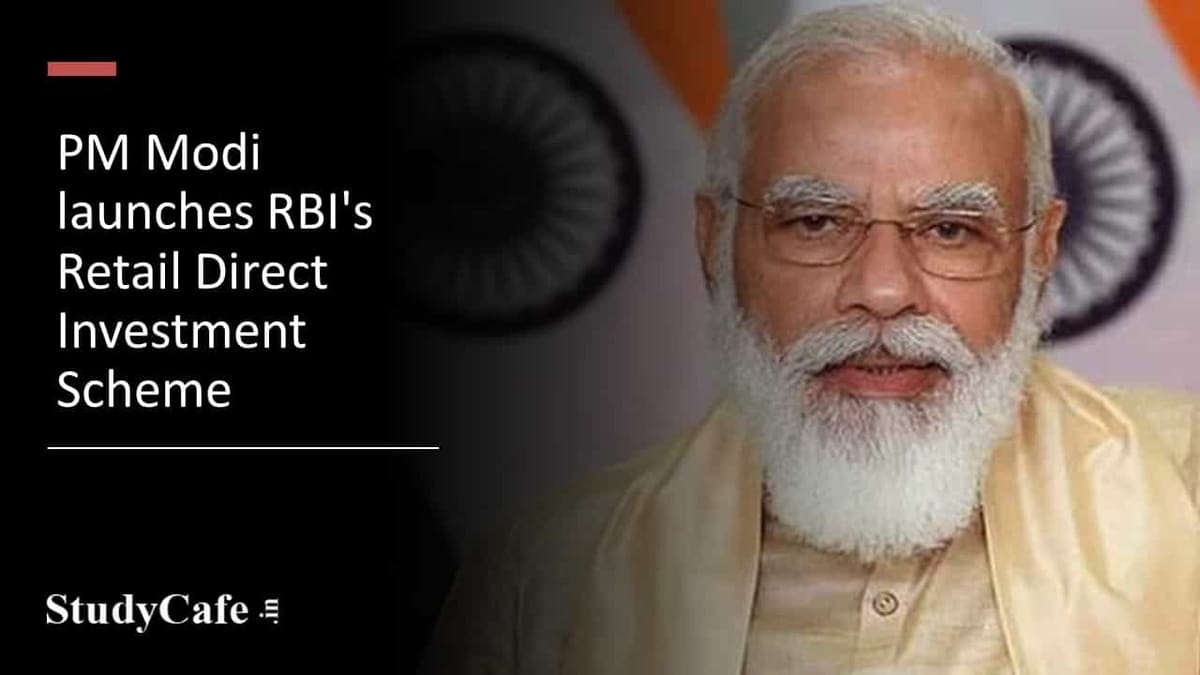Reetu | Nov 12, 2021 |

PM Modi launches RBI’s Retail Direct Investment Scheme
Prime Minister Narendra Modi launched the ‘RBI Retail Direct programme’ today in a virtual meeting. Retail investors can use the system to buy and sell government bonds online. The scheme was introduced by the Reserve Bank of India (RBI) in its February 2021 monetary policy.
He also stated that the RBI’s two programmes, the retail direct scheme and the integrated ombudsman scheme, will encourage financial inclusion.
While launching two new, customer-centric initiatives, the Prime Minister stated that these programmes would broaden the potential for investment and strengthen the customer grievance redressal procedure.
The retail direct system, he claimed, will allow small investors to earn guaranteed returns by investing in securities while simultaneously assisting the government in raising funds for nation-building.
He stated that the Reserve Bank-Integrated Ombudsman Scheme (RB-IOS) aims to improve the grievance resolution procedure for resolving customer complaints against firms regulated by the central bank.
“One Nation-One Ombudsman” has become a reality, he stated, with the commencement of the scheme.
The RBI Retail Direct Scheme aims to improve retail investors’ access to the government securities market. It provides ordinary investors with a new way to invest directly in securities issued by the federal and state governments.
Investors will be able to open and maintain their government securities accounts with the RBI online for free. Taking use of technical improvements, the plan provides a gateway for investors to invest in central government securities, treasury bills, state development loans, and sovereign gold bonds.
The scheme places India among the few countries that provide such a service.
This scheme (RB-IOS) will eliminate jurisdictional restrictions as well as restricted grounds for complaint. Customers will be able to submit documents, follow the progress of complaints filed, and provide feedback through a single point of contact at the RBI.
Complaints that are not covered by the ombudsman scheme will continue to be handled by the Customer Education and Protection Cells (CEPCs) located in the RBI’s 30 regional offices.
With greater knowledge, digital penetration, and financial inclusion, the number of complaints filed against various regulated businesses has skyrocketed. According to RBI data, the number of complaints increased from 1.64 lakh in 2017-18 to 3.30 lakh in 2019-20.
The RBI has recently taken several steps to strengthen the customer grievance redressal system of regulated entities, including the publication of guidelines for strengthening Internal Ombudsmen, the implementation of graded regulatory and supervisory actions, and the launch of the Complaints Management System (CMS) in 2019.
Following a study, the RBI decided to combine the three ombudsman schemes into one, as well as simplify the scheme by encompassing all complaints regarding deficiency in service by centralising the reception and initial processing of complaints to improve process efficiency.
The RBI’s alternate grievance redress mechanism currently consists of three ombudsman schemes: the Banking Ombudsman Scheme (BOS), which was launched in 1995, the Ombudsman Scheme for Non-Banking Financial Companies (OS-NBFC), which was launched in 2018, and the Ombudsman Scheme for Digital Transactions (OSDT), which was launched in 2019.
The schemes are managed by the RBI Ombudsman’s 22 offices (ORBIOs). Complaints that do not fall under the purview of the Ombudsman mechanism are addressed by the Consumer Education and Protection Cells (CEPCs) located in each of the RBI’s 30 regional offices.
The three schemes, which changed over time, had specific grounds for complaints that operated as a limiting factor, distinct grounds for complaints that resulted in uneven redress across customers of different organisations, and varied compensation mechanisms.
In case of any Doubt regarding Membership you can mail us at [email protected]
Join Studycafe's WhatsApp Group or Telegram Channel for Latest Updates on Government Job, Sarkari Naukri, Private Jobs, Income Tax, GST, Companies Act, Judgements and CA, CS, ICWA, and MUCH MORE!"